Skilled Labor Migration Rises In Iran
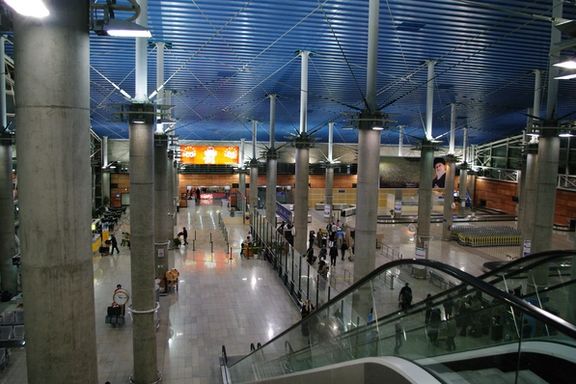
An Iranian labor official has raised concerns about the trend of skilled labor migration from Iran to other countries, including Iraq, Oman, and Turkey.

An Iranian labor official has raised concerns about the trend of skilled labor migration from Iran to other countries, including Iraq, Oman, and Turkey.
In a Saturday interview with Tasnim News Agency, Somayeh Golpour, the head of the Supreme Council of Workers' Guilds in Iran, emphasized that reports indicate a notable increase in migration, posing challenges to the country's workforce.
Golpour expressed her concern about the sluggish pace of replacing skilled workers and pointed out that, “paradoxically, even as investors show a preference for investing more in other countries, the replacement of the skilled workers remains slow within Iran.”
One significant factor contributing to the migration, according to Golpour, is the substantial disparity in minimum wages. She noted that when the minimum wage in destination countries reaches 250 to 300 million rials (500 to 600 USD), Iranian workers are drawn to migrate for better economic prospects.
Iranian workers are set to receive a government approved average salary increase of 20 percent starting in March, amid an annual inflation rate of around 50 percent.
The new minimum monthly wage has been set at 115 million Iranian rials or about 220 US dollars.
Attributing the migration phenomenon to low purchasing power, economic recession, reduced production, and liquidity issues in banks, Golpour identified them as key factors contributing to inflation in the country.
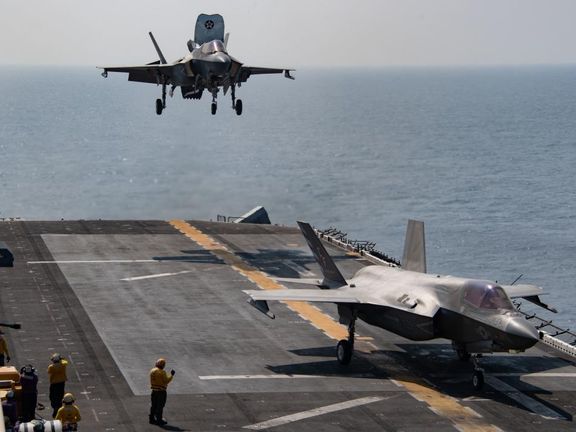
The United States launched another airstrikes on Saturday against a Houthi anti-ship missile aimed at the Gulf of Aden, Central Command announced.
"As part of ongoing efforts to protect freedom of navigation and prevent attacks on maritime vessels, on January 20 at approximately 4 a.m. (Sanaa time), US Central Command forces conducted airstrikes against a Houthi anti-ship missile that was aimed into the Gulf of Aden and was prepared to launch," CENTCOM said in a statement.
The decision to launch the airstrikes was prompted by an assessment that the Houthi missile posed a direct threat to both merchant vessels and US Navy ships operating in the region. The military emphasized that the destruction of the missile was undertaken in self-defense.
The primary objective of this action was to bolster the safety and security of international waters for both US Navy and merchant vessels, according to the CENTCOM.
The recent airstrike is part of a broader series of defensive strikes initiated against Houthi targets since January 12, as outlined by the Biden administration. The goal is to curtail the Houthis' capabilities to target vessels in the Red Sea, a crucial route for global oil and merchandise shipments.
The Iran-backed Houthi forces have been targeting commercial ships in the Red Sea and have issued warnings of potential attacks on all Israeli-bound vessels. The group claims the actions are expressions of solidarity with Palestinians facing what they describe as Israel's "aggression and siege" in Gaza.
Last month, US Defense Secretary Lloyd Austin announced the launch of Operation Prosperity Guardian, a multinational mission aimed at countering Houthi attacks and ensuring maritime security in the region.
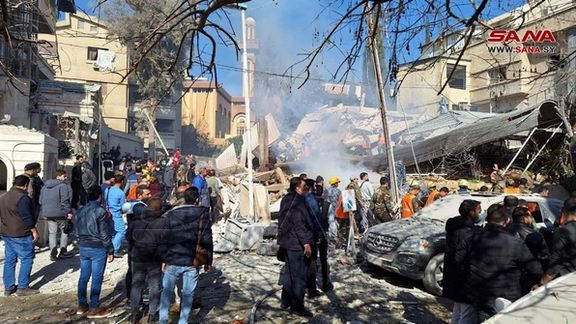
Iran’s Foreign Ministry has strongly condemned a suspected Israeli airstrike Saturday, which claimed the lives of three IRGC generals and two other officers in Syria.
Blaming the strike on Israel and calling it “criminal and aggressive,” the ministry’s spokesman Naser Kanaani urged the international community and the UN Security Council “to adopt a clear stance” and condemn the attack categorically.
The Islamic Republic reserves the right to respond to the offensive “at the appropriate time and place,” he went on to say.
Earlier in the day, Syria’s state-run SANA news agency reported, “An attack targeted a residential building in the Mazzeh neighborhood in Damascus, resulting from an Israeli aggression.”
The IRGC quickly confirmed in a statement that four of its forces lost their lives in the air strikes The slain IRGC officers were named as Hojatollah Omidvar, Ali Aqazadeh, Hossein Mohammadi and Saeed Karimi. A fifth IRGC officer identified as Mohammad-Amin Samadi later succumbed to his wounds and died.
Hojatollah Omidvar, also known as Haj Sadegh and Yousef Omidzadeh, served as the head of the IRGC Quds Force intelligence unit in Syria. According to Iranian state media, Omidvar’s deputy introduced under the pseudonym of “Haj Gholam” was also killed in the attack. It is not yet clear what his real name was.
In June 2023, the Washington Post reported that Omidzadeh “identified U.S. Humvee and Cougar armored vehicles in Syria” in order to target them. According to the report, he discussed assigning operatives to take photos from the roads that US forces in Syria used.
Meanwhile, Iran’s proxies Hamas and Palestinian Islamic Jihad condemned the Damascus attack. Hamas called it “the violation of the sovereignty of an Arab state” and Islamic Jihad accused Israel of attempting to expand the scope of war in the region.
Hours after the deadly incident, Iran-backed militant groups in Iraq launched rockets at Assad Air Base in the western province of Anbar, where US forces are stationed. They sustained no serious injuries in the attack, but several Iraqi troops were wounded.
“This could be Iran’s Axis of Resistance retaliating for the earlier strikes by Israel killing IRGC officers in Syria,” Jason Brodsky, Policy Director at United Against Nuclear Iran (UANI), wrote on X.
Though the Iranian regime has avoided any direct military involvement in the Gaza war, Tehran has used its proxy groups in the region such as Houthis and Hezbollah to attack Israeli and American targets. Yemeni Houthis, in particular, have disrupted regional stability and international trade by targeting shipping lanes in the Red Sea, the Gulf of Aden, and the Bab el-Mandeb Strait.
The Iranian parliament also responded to the killings of IRGC commanders. Parliamentary Speaker Mohamad Bagher Ghalibaf warned that “a severe punishment” awaits Israel as “the warriors will certainly retaliate this crime.”
Esmail Kowsari, a former IRGC general and member of parliament’s National Security and Foreign Policy Commission, confirmed that the whereabouts of the slain commanders in Syria were identified. Kowsari called for the arrest of “spy agents” in Damascus, adding that Israel has had “agents” in Syria, Lebanon and other neighboring countries since the past.
In December, Razi Mousavi (aka Seyyed Razi) was killed in an alleged Israeli airstrike near Damascus. He headed IRGC’s ‘logistics’ and military coordination in Syria, getting weapons for and coordinating Iran-backed forces in Syria and Lebanon.
The Islamic Republic has repeatedly threatened Israel with severe punishments over its alleged role in the killings of IRGC commanders and forces in the region. However, Tehran has refrained from a direct attack against Israel.
Earlier in the week, the IRGC attacked Iraq’s Kurdistan region in what it called an attempt to target Israeli agents. Iran’s missiles hit a civilian house in Erbil belonging to Peshraw Dizayee, killing him and 4 members of his family. Dizayee was a business mogul and head of Falcon Investment Group. Following the raid, IRNA, the Iranian state news agency, released a report that accused Dizayee of collaborating with Israel. Kurdistan officials and the Iraqi government have both rejected the allegation.
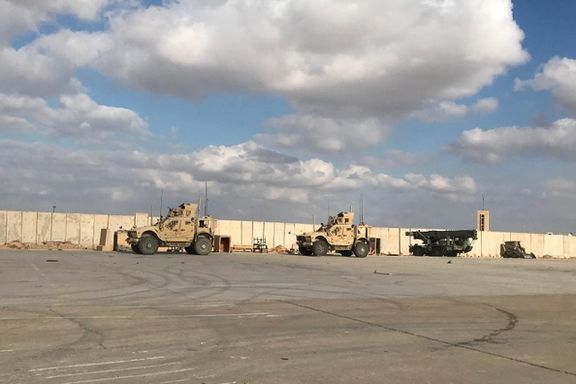
Iran-affiliated militias in Iraq have fired a large number of rockets at the Ain Al-Asad military base hosting US troops on Saturday, Iraqi media reported.
Reuters quoted a US official as saying that American personnel suffered minor injuries and a member of Iraq's security forces was seriously wounded in an attack citing initial assessments, which are subject to change. Some reports later said several Iraqi troops have been wounded.
The attack came after an Israeli air strike killed five officers of Iran’s Revolutionary Guard (IRGC) in Damascus. Among those who died when a building was targeted by precision munitions, was Hojjatollah Omidvar or Hajj Sadegh, a senior Quds Force general, and apparently a senior intelligence officer.
The official, who spoke on condition of anonymity to Reuters, said initial reports indicated that the base was hit by ballistic missiles but left open the possibility the base was hit by rockets, adding an assessment was ongoing.
Iran’s proxy forces in Iraq and Syria have launched around 140 attacks against US forces in both countries since mid-October in retaliation to US support for Israel. The Biden administration has retaliated on a few occasions, but it is not clear how it would respond to this latest attack.
Iran's Foreign Ministry spokesman Naser Kanaani condemned the airstrike in Damascus blamed on Israel saying the Islamic Republic reserves the right to respond to Israel "in an appropriate time and place."
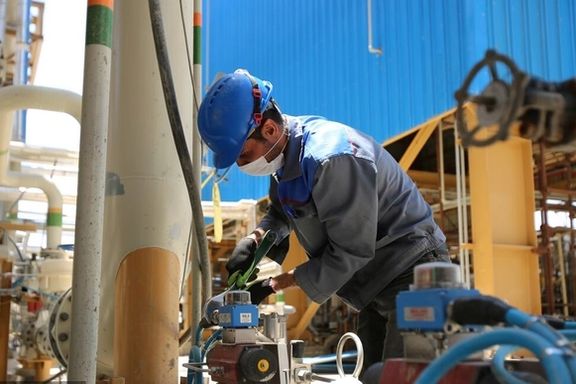
Contract workers from the South Pars Gas Complex on Iran's Persian Gulf coast continued their protests on Saturday for the third consecutive week.
Amid an information blackout by state media, a Telegram channel following labor news and regularly reporting on the demonstrations, announced that the latest protests encompassed nine refineries of the South Pars.
The protesting workers have made it clear that they intend to persist with their gatherings during specified hours and days until their demands are addressed by the authorities.
According to the Telegram channel, the primary demands of the refinery workers include the removal of intermediary contracting companies, the complete implementation of the job classification plan, and the utilization of benefit cards.
Simultaneously, reports have surfaced regarding protests by contract workers in the oil industry in Ahvaz. The Civil civil protest Telegram channel disclosed that the main demands of the protesters revolve around the full implementation of the legal resolution issued by the Administrative and Employment Council of the Oil Industry in 2021 regarding improvement of work conditions. Other demands include amending the calculation formula for the productivity bonus to align with that of fixed-term employees and revising the overtime calculation formula based on the Labor Law.
The protests are indicative of the escalating frequency of workers' demonstrations in Iran in recent years, signaling a growing discontent within the labor force. The challenges faced by contract workers in both the South Pars Gas Complex and the oil industry in Ahvaz underscore the urgency for authorities to address the concerns of the workforce.
In recent years, Iran's oil and gas sector have replaced thousands of regular employees with contract workers, who have to endure hard conditions with low pay.

Commanders from Iran's IRGC and Lebanon's Hezbollah are in Yemen helping to direct Houthi attacks on Red Sea shipping, regional and Iranian sources told Reuters.
Iran - which has armed, trained and funded the Houthis - stepped up its weapons supplies to the militia in the wake of the war in Gaza, which erupted after Iranian-backed Hamas attacked Israel on Oct. 7, four regional sources said.
Tehran has provided advanced drones, anti-ship cruise missiles, precision-strike ballistic missiles and medium-range missiles to the Houthis, who started targeting commercial vessels in November in solidarity with Palestinians in Gaza, the sources said.
The Houthi campaign began after Iran’s ruler Ali Khamenei in early November urged Muslims to initiate a blockade of Israel.
IRGC commanders and advisers are also providing know-how, data and intelligence support to determine which of the dozens of vessels travelling through the Red Sea each day are destined for Israel and constitute Houthi targets, all the sources said.
However, Houthis have not necessarily targeted only vessels headed for Israeli ports or linked with Israel.
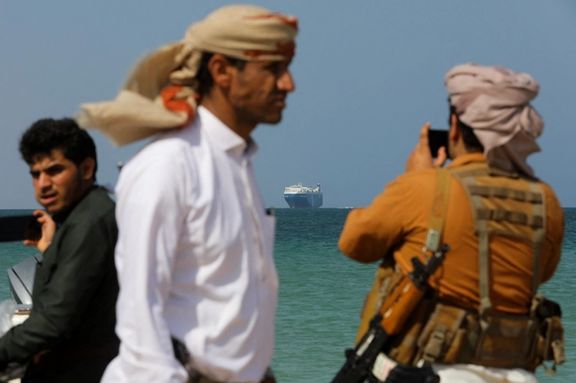
Washington said last month that Iran was deeply involved in planning operations against shipping in the Red Sea and that its intelligence was critical to enable the Houthis to target ships.
In his weekly news conferences, Iran's Foreign Ministry spokesman Nasser Kanaani has repeatedly denied Tehran is involved in the Red Sea attacks.
Houthi spokesperson Mohammed Abdulsalam denied any Iranian or Hezbollah involvement in helping to direct the Red Sea attacks when contacted by Reuters.
Houthi attacks have affected global shipping between Asia and Europe through the Bab al-Mandab strait off Yemen. That has triggered US and British air strikes on Houthi targets in the country, opening a new theater of conflict linked to the war in Gaza.
"The Revolutionary Guards have been helping the Houthis with military training (on advanced weapons)," an Iranian insider told Reuters. "A group of Houthi fighters were in Iran last month and were trained in an IRGC base in central Iran to get familiar with the new technology and the use of missiles."
The person said Iranian commanders had travelled to Yemen as well and set up a command center in the capital Sanaa for the Red Sea attacks which is being run by the senior IRGC commander responsible for Yemen.
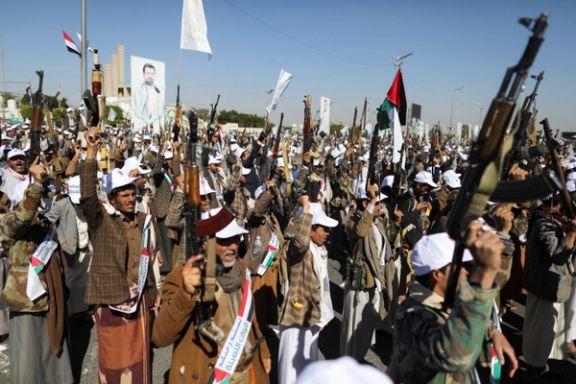
REGIONAL STRATEGY
The Red Sea attacks fit in with Iran's strategy of expanding and mobilizing its regional Shi'ite network of armed militias to project its influence and show its ability to threaten maritime security in the region and beyond, two analysts said.
They said Tehran wanted to show that the Gaza war could be too costly for the West if it drags on.
Tehran has avoided direct military involvement in the Gaza war, mainly using its proxy forces to project power.
"The Houthis are not acting independently," said Abdulaziz al-Sager, director of the Gulf Research Center think-tank, who based his conclusion on a close analysis of the capabilities of the group, which has an estimated 20,000 fighters.
"The Houthis, with their personnel, expertise and capabilities are not that advanced. Dozens of vessels cross through Bab al-Mandab daily, the Houthis don't have the means, resources, knowledge or satellite information to find the specific target and attack," he said.
White House national security spokeswoman Adrienne Watson also said last month that Iranian-provided tactical intelligence had been critical in enabling the Houthis to target ships.
According to two former Yemeni army sources, there is a clear presence of IRGC and Hezbollah members in Yemen. They are responsible for supervising military operations, training and reassembling missiles smuggled into Yemen as separate pieces, the two people said.
Abdulghani Al-Iryani, a senior researcher at the Sana'a Center for Strategic Studies, an independent think-tank, told Reuters: "It is clearly the case that the Iranians are helping identify the target and the destination. There is no local Houthi capacity to do that."
One senior regional source who follows Iran and who spoke on condition of anonymity said: "The political decision is in Tehran, the management is Hezbollah, and the location is the Houthis in Yemen."
WEAPONS AND ADVICE
Houthi spokesperson Abdulsalam said the group's aim was to target Israeli ships heading to Israel without causing any human or significant material losses. US and British strikes on Yemen would not force them to back down, he said.
"We don't deny that we have a relationship with Iran and that we have benefited from the Iranian experience in training and military manufacturing and capabilities, but the decision taken by Yemen is an independent one that has nothing to do with any other party," he said.
But a security official close to Iran said: "The Houthis have drones, missiles and everything needed for their fight against Israel, but they needed guidance and advice on shipping routes and ships, so it has been provided to them by Iran."
When asked what kind of advice Tehran offered, he said it was similar to the advisory role taken by Iran in Syria, ranging from training to overseeing operations when needed.
"A group of Iranian Guards members are in Sanaa now to help the operations," the security official said.
Washington and Persian Gulf Arab states have repeatedly accused Iran of arming, training and financing the Houthis, who follow an offshoot of Shi'ite Islam and are aligned with Tehran as part of its anti-Western, anti-Israel "Axis of Resistance" alongside Lebanon's Hezbollah and groups in Syria and Iraq.
While Iran has denied having any direct role in the Red Sea attacks, Khamenei has praised the Houthis, saying he hoped their strikes would last "until victory".
Adapted version of an exclusive Reuters report